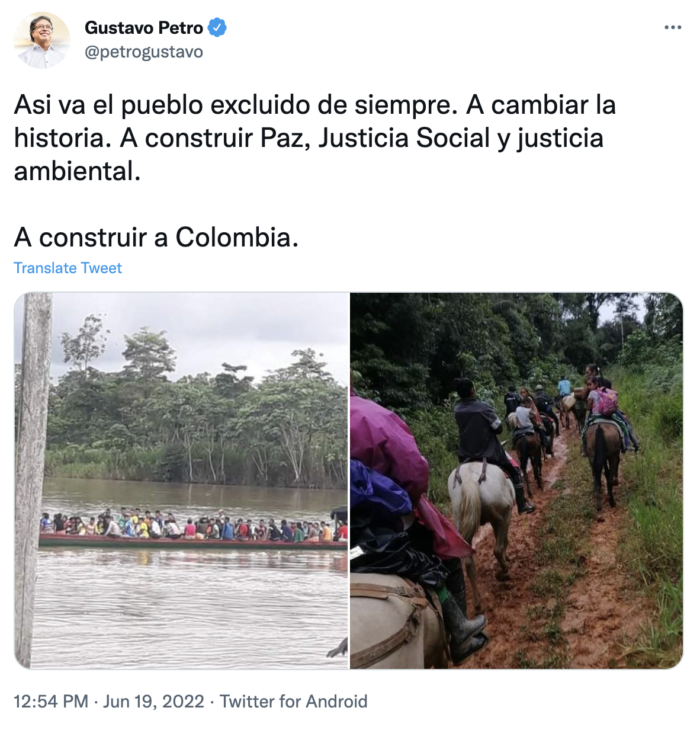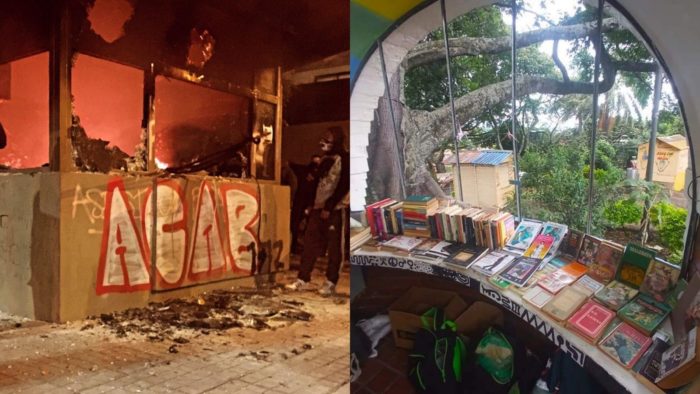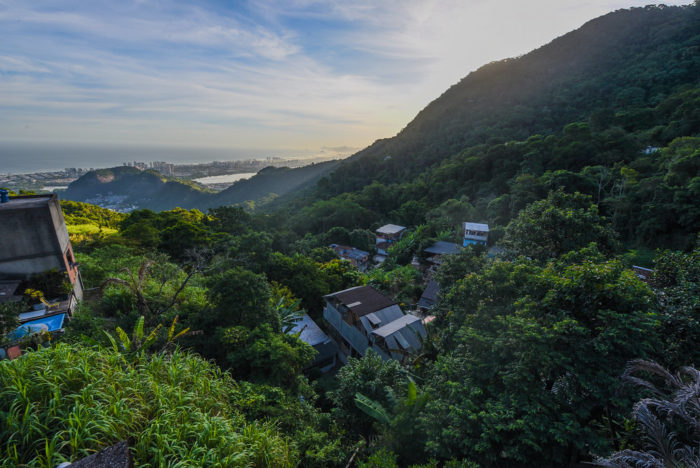Colombia has just elected left-winger Gustavo Petro; Bolsonaro’s toxic policies claim two more high-profile victims.
The (nuanced) ‘Pink Tide’ continues to spread across Latin America with Gustavo Petro elected Colombia‘s next president last Sunday 19 June. Notably, his vice-president Francia Marquez is an Afro-Colombian environmental activist from Cauca. This win follows the victory of Gabriel Boric in Chile in December, left-of-centre presidential candidates in Peru and Honduras in 2021, and in Mexico, Argentina and Bolivia between 2018 and 2020. In Brazil, Lula continues to lead in polls concerning the October 2022 elections.
Petro has said he envisions a progressive alliance with Chile and Brazil, and last night echoed his dreams of a Pan-American left built not on extractive industries but on protecting the environment. He said he would normalize relations with Venezuela and work closely with the US.
Colombia
In his first speech after winning the presidential run-off against Rodolfo Hernández, Petro invited the mother of Dylan Cruz, an 18-year-old peaceful demonstrator who was killed by ESMAD riot police in 2019, to speak. She represents thousands of mothers who’ve lost their sons to state violence. Silvia Rothlisberger reported for LAB on the mural painted in South London last month to honour the life of Lucas Villa, another peaceful protester who was killed by ESMAD riot police during protests last year.

Silvia Rothlisberger also wrote about the community libraries which were established in police stations across Cali during the national strike and ensuing Colombian protests in 2021. She explains that President Elect Gustavo Petro has vowed to dismantle ESMAD and revoke the requisite for military service among young Colombian men, as well as transferring the police force either to the Ministry of Justice and Law or to the Ministry of the Interior.
Criminal groups, including multiple FARC dissident groups, have been strengthened by the poor implementation of the Peace Accords under Iván Duque’s government, especially in areas like Cauca, where, according to INDEPAZ, over 238 social leaders and Human Rights advocates have been murdered since November 2016. Following the murder of Indigenous leader Albeiro Camayo Güetio in January 2022, Valentina Hernández translated interviews originally published in 070, to understand the government’s and FARC dissidents’ responsibility for the assassination. The peace agreement is a priority on the new ex-guerilla president’s agenda.

Brazil
British journalist Dom Phillips and Indigenous expert and guide, Bruno Pereira went missing on their return from a reporting trip in the Javari region of the Amazon on 5 June. Their bodies were found 10 days later. “Dom Phillips and Bruno Pereira have been killed in an undeclared global war against nature and the people who defend it”, Jonathan Watts wrote for The Guardian. Jan Rocha reported on their assassination for LAB.
Their disappearance and murder has ignited a campaign to urge Brazil’s authorities to protect these regions, their inhabitants and guardians. Amazonas is now the most violent state per capita in Brazil after an increase of 54% in the number of murders in the past year. Marcos Colón wrote about the ongoing threats in Brazil’s border regions, including Javari Valley where Bruno and Dom went missing.
Mining turns Pinheiro in northeastern Brazil into a ghost town, Kinga Harasim reports for our LAB and London Mining Network blog. ‘When I went through the neighbourhoods, I saw a scene of war. If I didn’t know I was in Pinheiro, I would easily believe I was in an area hit by a bomb,’ a researcher in the area reported.
Meanwhile, and more hopefully, ongoing collective work in the favela of Vale Encantado in Rio de Janeiro brings the neighbourhood closer to its goal of becoming economically and environmentally self-sufficient. Whilst they develop a biosystem for sewage treatment and solar panels to power the area and protect their local environment, inhabitants face down a long-term threat of eviction. Rosie Thornton reports for LAB.
Women’s community responses to the Covid-19 pandemic in Rio also inspired long-term social transformation in the city’s favela communities, recent research in the favelas of Maré shows. Moniza Rizzini Ansari and Cathy McIlwaine from the Women Resisting Violence project report.

Mining and Covid-19
Latin America accounts for almost a third of Covid-19 deaths despite making up less than 10 percent of the world’s population. Many of the region’s economies also suffered disproportionately when compared to the rest of the world. Morgan Fairless looked at some of the lessons the region can learn from the Covid-19 catastrophe.
If you’d like contribute to LAB’s Covid-19: Loss, Survival, Recovery, Transformation project, please get in touch with Emily Gregg on emily.gregg@lab.org.uk.
LAB also recommends this 72-page report from the Coalition Against the Mining Pandemic, looking at the challenges and resilience of Indigenous peoples and rural communities facing David and Goliath battles to protect their land and water from the long term harms of mineral extraction during the COVID-19 pandemic.

Patreon
We’re still urging all LAB newsletter subscribers to sign up to Patreon. Exclusive content includes a first-look at each Environmental Defenders article; interviews with Ana Paula, a human rights activist from the group Mães de Manguinhos and with Brazil’s first openly gay and proud federal deputy, Jean Wyllys; and Voz, LAB’s quarterly dispatch – the most recent issue analysing Xiomara Castro’s failed promises for women in Honduras.
